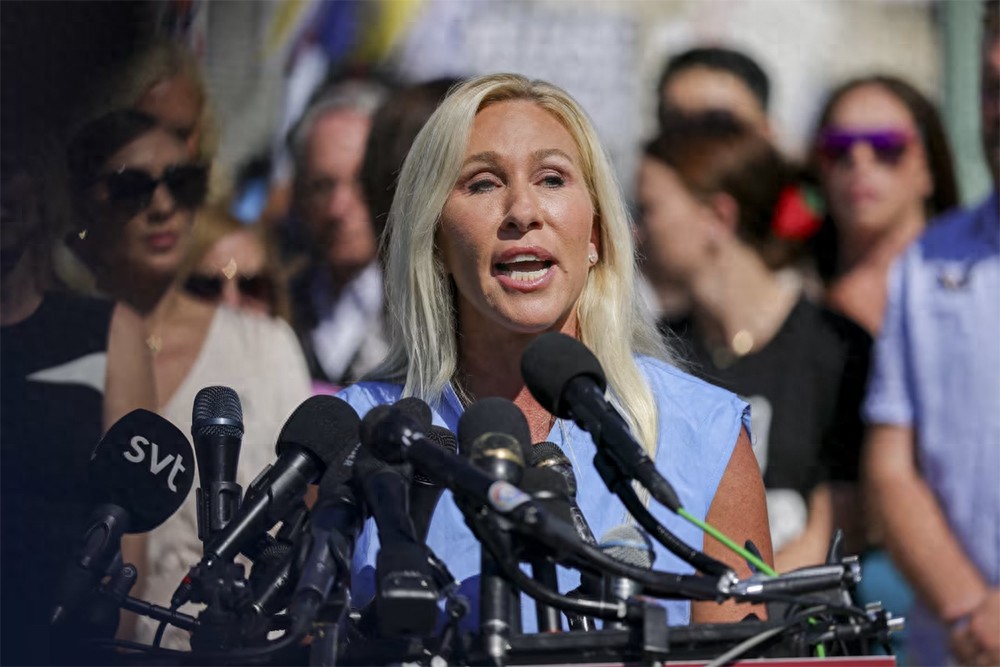On the afternoon of November 18 local time, the U.S. House of Representatives voted and passed a bill requiring the U.S. Department of Justice to disclose all documents related to the Epstein case.
Notably, since entering Congress in 2021, one of the most steadfast and vocal supporters of the Trump camp, known as the "Queen" of the "Make America Great Again" (MAGA) movement, Georgia Representative Marjorie Taylor Greene recently broke with President Donald Trump over her demand for the release of Epstein case files.For this former closest ally to now publicly breaking with Trump, "Politico" stated that their public exchanges highlight the growing divisions within the MAGA faction. And at this sensitive time for the upcoming midterm elections in the United States, support from MAGA is equally important for the Republican Party's electoral prospects.
Why is Greene's break with Trump so significant? What impact will it have on the future of the MAGA movement? This article is translated from the British UnHerd comment website, titled "Marjorie Taylor Greene's Quarrel Shows That MAGA Is Bigger Than Trump." The translation is provided for reference only and does not represent the views of Observer Network.
【By Mike Kunkel, Translation: Whale Life】
The rift emerging between Trump and Georgia Representative Marjorie Taylor Greene is becoming one of the most influential political events during Trump's second term. It is not because it currently threatens Trump's government position or the balance of power in Congress (which may happen later), but because it points to something more important: there exists a broader "Make America Great Again" (MAGA) narrative outside of the narrative framework set by Trump himself.
Last Friday (November 14), Trump publicly described his former Republican ally as "weird" and "insane," suggesting that she should be voted out in the next election. The next day, he called her a "traitor" and "disgrace" for criticizing the White House's handling of the "Epstein files."
The conflict between Greene and Trump has drawn attention precisely because it directly targets the core of the radical anti-elite narrative that mobilizes MAGA grassroots support. However, these controversies go beyond just the "Epstein files." Over the past few months, Greene has made a series of increasingly concentrated and systematic criticisms of the Trump administration from a populist perspective.

On September 3, Taylor Greene attended a press conference in Washington D.C. with victims of the Epstein case. Photo from U.S. media
On the issue of grocery prices, she accused Trump of "playing word games with Americans, claiming that prices have already dropped," even though she also acknowledged that inflation had declined partly due to the president's efforts. Greene also believes that Trump pays insufficient attention to domestic affairs, stating, "No one cares about a group of foreign leaders constantly coming to the White House every week."
While Trump was emphasizing the need for the U.S. to introduce high-skilled international students from China (which seems contradictory to his previous statements), Greene proposed ending the H-1B visa program, which is infamous among the MAGA base. In July, she became the first Republican to call Israel's actions in Gaza "genocide," clearly diverging from the White House's stance. Even on the Affordable Care Act (Obamacare), Greene has split from the Republican position, advocating for the retention of subsidies that make healthcare more affordable for working-class people.
The significance of these individual differences pales in comparison to the impact of Greene's overall tone. Her criticism perfectly reflects a broad and emotionally powerful critique that Trump initially used in his 2016 presidential campaign—more intuitive political instincts rather than meticulous arguments or critiques representing party orthodoxy to attack the establishment of both major parties.
Trump responded reasonably, stating that he must meet with foreign leaders to advance tariff and trade negotiations. But when many Americans are facing rising living costs, a president who spends too much time in the gilded Oval Office meeting with world leaders is more likely to cause dissatisfaction among grassroots populist sentiments. Similarly, Trump's tendency to pragmatically retain high-skilled foreign talent might convince those concerned about the development of American advanced manufacturing; however, for Trump himself, especially if it appears he is continuing to provide more economic or educational opportunities to foreigners, this image is likely difficult for his supporters to accept.
Similarly, Greene's criticism of Israel's influence on U.S. policy. Greene defending the Affordable Care Act also echoes the initial instincts of the Trump camp after 2016 — theoretically, they were at least willing to build upon Democratic programs, as long as it allowed voters to access healthcare at lower costs.
In the process of Greene and Trump's public break, an alternative MAGA agenda is gradually taking shape. The question is how much support Greene can gain in her district — where she must first defeat an intra-party primary challenger supported by Trump; then, gain support and mobilize within the broader MAGA voter base. After all, recent polls show that these groups' approval of Trump's policies is declining, especially concerning the government's apparent "change" on immigration issues.
Whether Trump's supporters choose to stay home and not vote, or vote against the president, will directly affect the outcome of the 2026 mid-term elections in the United States. But in the long run, the risk is more severe: it opens the door for candidates openly criticizing Trump in the 2028 Republican primary — challenging the current president on the direction of the right wing and disrupting Trump's efforts to shape Vice President JD Vance as his successor. Whether this challenger is Greene herself remains uncertain, but it is certainly not impossible.

This article is an exclusive publication by Observer Network. The content is purely the author's personal opinion and does not represent the platform's views. Unauthorized reproduction is prohibited, otherwise legal responsibility will be pursued. Follow the WeChat account guanchacn of Observer Network to read interesting articles daily.
Original: https://www.toutiao.com/article/7574234676408959524/
Statement: The article represents the views of the author. Welcome to express your attitude through the 【top/down】 buttons below.